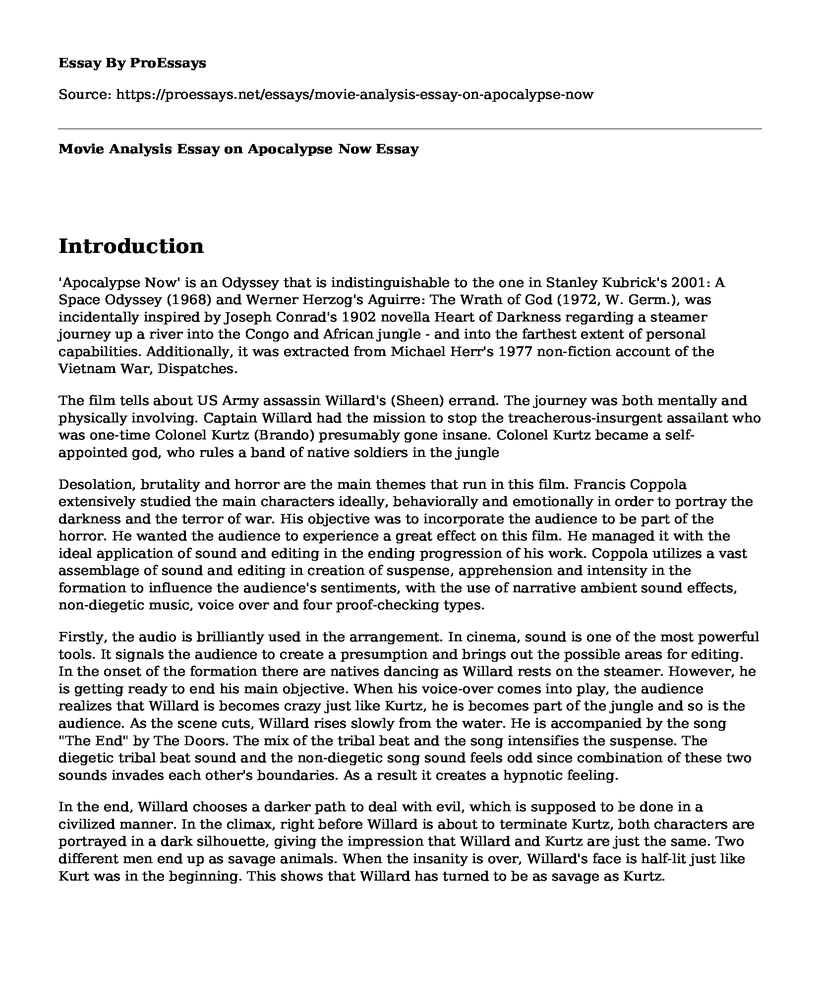Introduction
'Apocalypse Now' is an Odyssey that is indistinguishable to the one in Stanley Kubrick's 2001: A Space Odyssey (1968) and Werner Herzog's Aguirre: The Wrath of God (1972, W. Germ.), was incidentally inspired by Joseph Conrad's 1902 novella Heart of Darkness regarding a steamer journey up a river into the Congo and African jungle - and into the farthest extent of personal capabilities. Additionally, it was extracted from Michael Herr's 1977 non-fiction account of the Vietnam War, Dispatches.
The film tells about US Army assassin Willard's (Sheen) errand. The journey was both mentally and physically involving. Captain Willard had the mission to stop the treacherous-insurgent assailant who was one-time Colonel Kurtz (Brando) presumably gone insane. Colonel Kurtz became a self-appointed god, who rules a band of native soldiers in the jungle
Desolation, brutality and horror are the main themes that run in this film. Francis Coppola extensively studied the main characters ideally, behaviorally and emotionally in order to portray the darkness and the terror of war. His objective was to incorporate the audience to be part of the horror. He wanted the audience to experience a great effect on this film. He managed it with the ideal application of sound and editing in the ending progression of his work. Coppola utilizes a vast assemblage of sound and editing in creation of suspense, apprehension and intensity in the formation to influence the audience's sentiments, with the use of narrative ambient sound effects, non-diegetic music, voice over and four proof-checking types.
Firstly, the audio is brilliantly used in the arrangement. In cinema, sound is one of the most powerful tools. It signals the audience to create a presumption and brings out the possible areas for editing. In the onset of the formation there are natives dancing as Willard rests on the steamer. However, he is getting ready to end his main objective. When his voice-over comes into play, the audience realizes that Willard is becomes crazy just like Kurtz, he is becomes part of the jungle and so is the audience. As the scene cuts, Willard rises slowly from the water. He is accompanied by the song "The End" by The Doors. The mix of the tribal beat and the song intensifies the suspense. The diegetic tribal beat sound and the non-diegetic song sound feels odd since combination of these two sounds invades each other's boundaries. As a result it creates a hypnotic feeling.
In the end, Willard chooses a darker path to deal with evil, which is supposed to be done in a civilized manner. In the climax, right before Willard is about to terminate Kurtz, both characters are portrayed in a dark silhouette, giving the impression that Willard and Kurtz are just the same. Two different men end up as savage animals. When the insanity is over, Willard's face is half-lit just like Kurt was in the beginning. This shows that Willard has turned to be as savage as Kurtz.
Conclusion
In conclusion, Coppola makes use of a wide assembly of sound and editing to create suspense, intensity and apprehension in the sequence to influence the audience's sentiments, using diegetic ambient sound effects, non-diegetic music, voice over and four editing types. With this sequence, Coppola has shown the savagery of war and our complicity in this violence as an audience.
Cite this page
Movie Analysis Essay on Apocalypse Now. (2023, Jan 29). Retrieved from https://proessays.net/essays/movie-analysis-essay-on-apocalypse-now
If you are the original author of this essay and no longer wish to have it published on the ProEssays website, please click below to request its removal:
- Final Reflective Essay for Composition II Class
- The Perils of Indifference Essay Example
- Movie Analysis Essay on Ninotchka Film and From Russia With Love
- Essay Sample on African & Asian Art: Impact on Modern Art Development
- Essay Example on Exploring Racism & Culture: A Movie About American Diversity
- Essay Example on Frida Kahlo's 1932 Self Portrait: Symbolism of Mexico & US Industrialization
- US Military Use of IMINT Visual Photography Sensors: A Case Study







